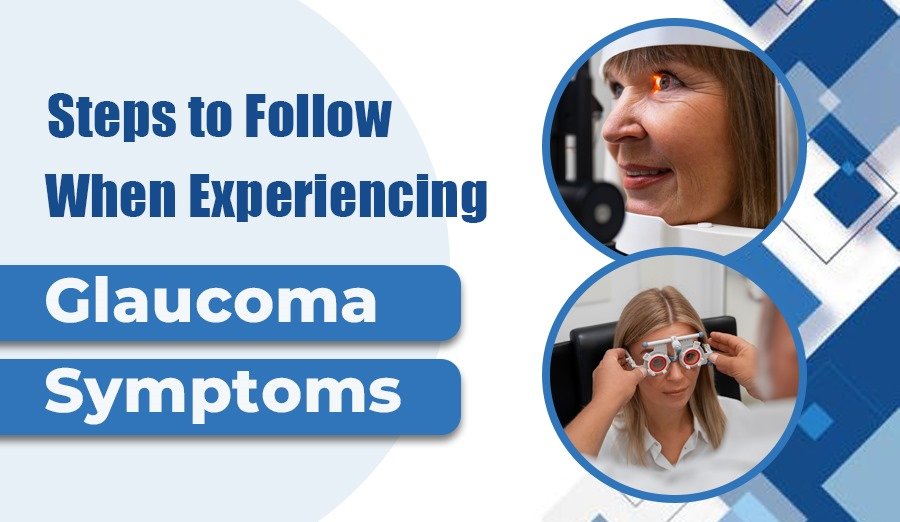-
Pushpanjali Eye Care, Golpark, Kolkata-700029
Pushpanjali Eye Care, Golpark, Kolkata-700029

By Admin
Hello Reader!
Welcome to the blog page of Pushpanjali Eye Hospital one of the best eye hospitals in Kolkata. Here in this blog, we will share with you the general steps you should take after having Glaucoma symptoms. Hope this blog will help you.
Glaucoma is a serious eye condition that can lead to irreversible vision loss if not detected and treated early. It often develops slowly and without noticeable symptoms in its early stages, earning it the nickname “the silent thief of sight.” If you suspect you have glaucoma, it is crucial to take immediate action to preserve your vision. Pushpanjali Eye Care, one of the best eye hospitals in Kolkata, is here to guide you through the necessary steps.

Understanding the symptoms of glaucoma is the first step toward early detection and treatment. While symptoms can vary depending on the type of glaucoma, common signs include:
If you experience any of these symptoms, it’s imperative to seek medical attention promptly.
The moment you notice any symptoms associated with glaucoma, contact Pushpanjali Eye Care, a leading eye hospital in Kolkata, to schedule a comprehensive eye examination. Early diagnosis is key to managing glaucoma effectively and preventing vision loss.

During your visit, the ophthalmologist will perform a thorough eye examination to assess your eye health and diagnose glaucoma. The exam typically includes:
If diagnosed with glaucoma, your eye specialist will develop a personalized treatment plan based on the severity and type of glaucoma. Treatment options may include:

Glaucoma is a chronic condition that requires ongoing monitoring. Regular follow-up appointments are crucial to ensure that your treatment is effective and to make any necessary adjustments. At Pushpanjali Eye Care, one of the best eye hospitals in Kolkata, we provide continuous care and monitoring to manage your condition effectively.
In addition to medical treatment, certain lifestyle changes can help manage glaucoma:
Educate yourself about glaucoma and its management. Understanding your condition helps you adhere to your treatment plan and recognize any changes in your symptoms that may require immediate attention.
Answer:
If you experience symptoms of glaucoma such as blurred vision, halos around lights, eye pain, redness, sudden vision loss, or tunnel vision, schedule an appointment with an eye specialist immediately. Early diagnosis and treatment are crucial to preventing permanent vision loss. Pushpanjali Eye Care, one of the best eye hospitals in Kolkata, is equipped to provide comprehensive eye examinations and care.
Answer:
Glaucoma is diagnosed through a comprehensive eye examination that includes several tests:
Answer:
Treatment options for glaucoma aim to lower intraocular pressure and include:
Answer:
The frequency of follow-up appointments depends on the severity and progression of your glaucoma. Typically, patients may need to see their ophthalmologist every 3 to 6 months. Regular monitoring is essential to ensure the treatment is effective and to make any necessary adjustments.
Answer:
Yes, certain lifestyle changes can support glaucoma management:
Answer:
Early detection is crucial because glaucoma often progresses without noticeable symptoms until significant vision loss occurs. Early diagnosis allows for timely intervention, which can prevent or slow the progression of the disease, preserving vision and quality of life. Regular eye exams at an eye hospital in Kolkata, like Pushpanjali Eye Care, are essential for early detection.
As one of the best eye hospitals in Kolkata, Pushpanjali Eye Care is committed to providing comprehensive and compassionate care for patients with glaucoma. Our team of experienced ophthalmologists and state-of-the-art facilities ensure that you receive the highest standard of care. We are dedicated to helping you maintain your vision and quality of life.
If you or a loved one are experiencing symptoms of glaucoma, don’t wait. Schedule an appointment with Pushpanjali Eye Care, the trusted eye hospital in Kolkata, and take the first step towards safeguarding your vision.
For more information or to book an appointment, visit our website or contact us directly. Your vision is our priority.